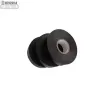Gas pipe wrap tape is specifically designed for use in protecting gas pipelines from corrosion. Here are situations and considerations where the use of gas pipe wrap tape is appropriate:
Corrosion Prevention:
The primary purpose of gas pipe wrap tape is to prevent corrosion on metal gas pipelines. It acts as a protective barrier against corrosive elements such as moisture, chemicals, and salts that can lead to the degradation of the pipeline over time.
New Pipeline Installations:
When installing new gas pipelines, it is common practice to apply gas pipe wrap tape as part of the corrosion protection system. This helps ensure the longevity and integrity of the pipeline from the outset, reducing the risk of corrosion-related issues in the future.
Repair and Maintenance:
Gas pipe wrap tape is also used during repair or maintenance activities on existing gas pipelines. If there are areas of the pipeline that have been exposed due to damage or wear, applying wrap tape can provide a protective layer, preventing corrosion in those vulnerable spots.
Above-Ground and Below-Ground Applications:
Gas pipe wrap tape is suitable for both above-ground and below-ground applications. Whether the pipeline is exposed to the elements or buried underground, the tape serves as a protective barrier against environmental factors that could lead to corrosion.

Recommended article:**How is bulk light magnesium oxide used?** Bulk light magnesium oxide is commonly used in various industries, including construction, ceramics, and agriculture, for applications such as insulation, 10 Questions You Should Know About Magnesium OxideHow Do Cold Plunge Pools Benefit Your Recovery?Unlocking Benefits of EP Magnesium Carbonate Light for HealthWhy Use Food Additives with Magnesium Sulfate?Why Embrace CAS 28578 16 7 USA OEM?PRIMAL™ AC-2337 Pure Acrylic Emulsion PolymerCompatibility with Various Pipeline Materials:
pipe wrapping tape for gas pipeline is designed to be compatible with different pipeline materials, including steel and other metals commonly used in gas pipelines. It adheres well to the surface of the pipe, providing a seamless and protective layer.
Resistance to Environmental Factors:
Gas pipelines are often exposed to various environmental factors, including UV radiation, temperature fluctuations, and moisture. Gas pipe wrap tape is engineered to resist these environmental factors, ensuring that it remains effective in providing corrosion protection over the long term.
Compliance with Regulations:
In many regions, there are regulations and standards in place that mandate the use of corrosion protection measures for gas pipelines. Gas pipe wrap tape, when applied according to manufacturer guidelines, helps comply with these regulations and ensures the safety and reliability of the gas distribution system.
Regular Inspections and Maintenance:
While gas pipe wrap tape provides effective protection, it is crucial to conduct regular inspections and maintenance to identify any damage or wear. Any areas where the tape is compromised should be promptly repaired or replaced to maintain the effectiveness of the corrosion protection system.
In summary, gas pipeline wrap tape is used to protect gas pipelines from corrosion in various scenarios, including new installations, repair and maintenance activities, and both above-ground and below-ground applications. It is an essential component of corrosion prevention measures to ensure the safety and integrity of gas distribution systems.
Recommended article:4 Tips to Select the Perfect Cryo Chamber MachineHow Does High-Performance Aluminum Alloy Wire Work?Buy Hydroxyethyl Cellulose Products - 10% Off, Ships In 5-9 ...Problem 3 Discuss the preparation, propert... [FREE SOLUTION]What Benefits Does MHEC Chemical Offer Wall Putty Makers?Where to Find Affordable Cryotherapy Chambers Today?Key Questions to Ask When Purchasing Pure Magnesium Oxide



Comments
All Comments (0)
Related Articles
Iron oxide nanopowder (20, 98%, 1x1 Kilogram
Iron oxide nanopowder (20, 98%, 1x1 Kilogram is for sale online through a direct partnership between ChemDirect and Chem-Impex International, Inc.. This ... $609.38 · Free 2-day delivery · 30-day returns · In stock
By Janey
109
0
0
How Does Hydroxypropyl Methylcellulose for Grout for Sale Work?
Hydroxypropyl Methylcellulose (HPMC) is a versatile, plant-derived polymer that plays a pivotal role in construction, particularly in grout formulations.
By Geym
85
0
0
How Does Cold Therapy Impact Recovery?
What is Cold Therapy?
By Helen
85
0
0
How To Turn Any Acrylic Paint Into Fabric Paint
Feb 27, 2016 — To use the fabric medium, you simply mix 1 part fabric medium with 2 parts acrylic paint . The fabric medium is a liquid that mixes easily with the paint and ... Missing: Polymer Emulsion
By Molly
77
0
0
How to Choose CAS 110 63 4 Bulk Order?
Selecting the right bulk order of CAS 110 63 4, which is primarily used in various industrial applications, is crucial for ensuring quality and compliance.
By Helen
80
0
0
How to Select Symmetric Dimethylurea White Powder?
Understanding Symmetric DimethylureaSymmetric Dimethylurea (SDMU) is an important chemical compound widely used in various industries, including pharmaceuticals, agricultural chemicals, and as a building block for synthesizing other compounds.
By Morgan
91
0
0
How Does an Intermittent Hypoxic Training Device Work?
Understanding Intermittent Hypoxic Training (IHT)Intermittent Hypoxic Training (IHT) is a technique designed to improve athletic performance and physical endurance by simulating high-altitude conditions.
By Marina
85
0
0
The Advantages of Incorporating Plastic Auxiliary Agents
The Advantages of Incorporating Plastic Auxiliary AgentsPlastic auxiliary agents are essential components in the plastics industry, providing a multitude of benefits that enhance the performance and application of plastic materials.
By Janey
78
0
0